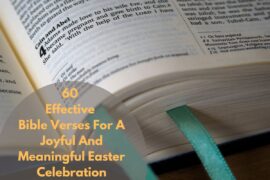Praying with open hands for many Christians has become more of a transaction than a dialogue. I was raised believing that if I lived my life according to God’s will, He would grant my wishes and my requests. God was more likely to grant my requests if I prayed “correctly,” that is, starting with praise, thanksgiving, and confession before submitting my petitions.
Praying with open hands is a particularly significant gesture among the many postures related to prayer.
Contents
Praying With Open Hands
All too frequently, when we pray, we don’t have faith in God’s character; instead, we think that God will work things out, considering our best efforts and sincere intentions.
Imagining my own hands, open and at ease, is the best picture I can think of for praying without spiritual restriction. Open hands convey that I’m not wringing them in dread, shaking my fist in rage, clinging to the result I want right now, or grabbing for today’s want.
The Significance of Open Hands
Opening your hands in prayer is a gesture whose meaning speaks directly to the human condition, making it transcend linguistic boundaries. Opening one’s hands is a very vulnerable gesture that conveys an openness to receiving grace, blessings, and guidance from the divine. It also indicates an unguarded, receptive stance. This gesture signifies a readiness to give up control and an admission of one’s reliance on a higher power.
Praying With Open Hands In several spiritual practices
Christianity
In Christian traditions, opening hands is frequently connected to submitting to God’s will. Raising one’s hands to heaven is considered a sign of surrender to the divine and faith in the intelligence and providence of God. It is a sign of humility and surrender, acknowledging that one’s future is not entirely within their control.
Islam
In Islam, a supplication known as a “dua” is an open-handed prayer. It is said that the Prophet Muhammad prayed with his hands extended, facing up, to express his request for Allah’s benevolence and blessings. This action expresses the believer’s dependence on the kindness and generosity of the Creator.
Buddhism
Open-handed gestures are frequently connected to mudras, which are symbolic hand positions that have particular spiritual meanings. Mudras are utilized in meditation and worship to foster attention, compassion, and openness, even though they are not a typical prayer posture. The offering and receiving of compassion and understanding could be represented by the open hand.
Hinduism
Open hands are frequently observed in mudras, each with a distinct meaning, in Hinduism. For instance, making the “abhaya mudra,” which entails raising the right hand and turning the palm outward, represents safety, bravery, and assurance. This gesture expresses faith in the benevolent ability to protect.
Benefits of Praying with Open Hands
- Cultivating Humility: By admitting the limits of human comprehension and control, open-handed prayer promotes humility. It encourages a state of acceptance and surrender that leads to a deeper relationship with God.
- Building faith: In life’s uncertainties, the open-handed stance fosters a sense of calm and security by reflecting a deep faith in the divine design. It enables people to let go of their worries and have faith that their prayers are heard.
- Gratitude Expression: Outstretched hands represent openness to both blessings and requests. People who approach prayer with open hands show gratitude for everything that they have in their lives, which cultivates an attitude of thankfulness.
Conclusions
Offering up prayers with open hands is a universal representation of trust and spiritual openness that cuts across all religious barriers. The act of praying with open hands relates to the universal human experience of seeking connection, direction, and comfort from a higher power, regardless of one’s religion or cultural background.








